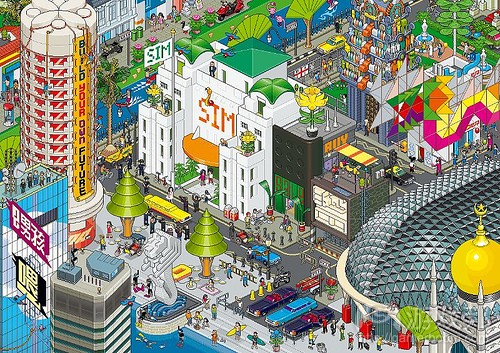Facebook已非初创公司的理想成长环境
作者:Tami Baribeau
我曾经预测过制作Facebook游戏已不再是个可持续发展的商业战略,对此Inside Social Games发表文章做出回应。在文章中,他们显然希望开发商能够继续将注意力放在Facebook游戏上。但我认为该文章还在许多地方误导了读者。
首先,该文章声称,我的观点是每款成功的Facebook游戏都需要通过创造俗套的机制才能吸引到特定群体用户。我并没有这么说过。无论Facebook游戏的目标用户是哪类群体(游戏邦注:无论是35岁左右的女性还是18至35岁的男性),开发商都会对游戏的功能和机制进行A/B测试,这是永恒不变的事实。
让我来说下社交游戏开发商是如何确定游戏呈现给玩家的功能和内容。首先,与手机游戏相比,在Facebook上进行分离测试要简单得多。顶级开发商会频繁利用这种分离测试。据我所知,Zynga和Playdom之类的公司会在发布任何可能影响盈利或留存率的重要功能之前使用A/B测试。也就是说,最先是设计师想到他们觉得能够改善游戏的创意体验,然后产品经理对功能进行分离测试并分析测试结果,最后才将功能正式发布。通常情况下,为证实功能是否能够获得成功,新功能的原型需要在短时间内制作完成。为确保游戏能够有良好表现,只有那些显著提升测试指标的功能才会被正式发布。
其次,Inside Social Games这篇文章的设想显得过于理想化。文章表示,较小的公司可以自由地尝试利用独特的方式来盈利,无需刻意模仿Zynga等大公司的做法。但是,文章忽略了一点,多数可供尝试的新盈利方法并不适合免费游戏。这些方法之前已经都测试过,结果都失败了。而且,Zynga也并非创造这些盈利方式的公司,他们不仅经常从其他社交游戏公司处寻找盈利功能的灵感,而且这些机制已经被《Habbo Hotel》、《Maple Story》和《Gaia Online》等免费游戏用了数年之久。我并不是想说只能通过这些方法来赚钱,但是在“游戏必须免费下载和体验”的前提下,你在微交易系统中只能使用这些做法。在所有的免费游戏中,出售装饰性道具和消耗类道具只是标准做法而已。Zynga的高明之处只是精心地利用测试手段来将ARPU达到最大值。
该文章还声称,Facebook游戏有可能实现1美元的ARPU和逾10万的DAU。我希望他们能够提供证据,因为我觉得这完全不靠谱。能够频繁获得逾10万美元日盈利的只有Zynga或EA的游戏,而这两家公司游戏的DAU都高达上百万。
Facebook社交游戏项目确实有可能实现可持续发展,但这取决于开发商在合理预算下构思和发布游戏以及通过游戏盈利的能力,同时与Facebook平台本身的发展也有一定的关联。社交游戏公司不可能都发展到Zynga这样的规模,但这或许也是最好的消息。与上市交易的公司相比,私有公司能够更加自由地在新兴市场中尝试新的做法。
从总体上说,我并非完全不同意Inside Social Games文章所提出的观点。诚然,将Facebook作为核心平台来运行社交游戏商业仍然是个可行之举,但是难度真得很高。如果运气较好,或许可以获得足够的游戏制作预算,并最终得到富有竞争力的产品。单单雇佣工程和产品管理方面的人才就要花费大笔的资金,至少在旧金山湾地区的情况是这样的。该文章不断地强调“我们不可能都成为像Zynga那样的公司”,就像是认为我将Zynga视为成功的标准。事实上,我并没有这么看。在社交游戏行业中,我多数时候都待在雇员数量不足25人的小公司里。我亲眼目睹两个公司被业内的大公司收购,而后者最后被更大的公司收购。我的想法是,能够盈利就是成功。我并非过于消极,但我不得不说,初创公司能够在Facebook上获得巨大成功的时代已经结束了。
游戏邦注:本文发稿于2011年12月14日,所涉时间、事件和数据均以此为准。(本文为游戏邦/gamerboom.com编译,拒绝任何不保留版权的转载,如需转载请联系:游戏邦)
Sure, it’s *possible* to make money off Facebook games….
Tami Baribeau
Inside Social Games posted a response to my prediction that Facebook games are no longer a sustainable business strategy (though they didn’t call it a response in the article). Aside from them obviously having a vested interest in seeing developers continue to gamble on the Facebook gaming space, I think the article misled readers in several places.
First of all, the article claims that my point of how every successful Facebook game has to create cookie cutter mechanics was in an attempt to appeal to a specific audience. I never actually said that. Regardless of what the Facebook gaming demographic is (whether it is 35+ year old women or 18-35 year old men) nothing changes the fact that developers are A/B testing their way into these features.
Let me tell you a bit about how social game developers arrive on shippable features. First of all, it is far easier on Facebook to do split testing than it is in mobile games. The ability to rapidly deploy without waiting for review times means that you can do time testing with statistical significance and standard bucketing of cohorts without too much trouble. The top developers utilize quite a bit of this split testing, some more than others. I know that companies like Zynga and Playdom use A/B testing as a rule before shipping any substantial feature than could affect monetization or retention. What this means in a lot of cases is that a designer comes up with a creative experience that they feel will enhance the game, then a Product Manager runs and analyzes a split test on the feature, and ends up throwing it out because it either negatively impacts metrics or doesn’t increase it at all. Generally, features are rapidly prototyped in order to prove success. In an interest in keeping the game lean and not muddying numbers, features aren’t shipped unless they show visible success in the numbers.
Secondly, this Inside Social Games article is a bit utopian. It’s saying that smaller companies are free to try to monetize in unique ways and that they don’t have to use “the Zynga methods” in order to make money. However, what it ignores is the fact that most of these attempts to monetize in new ways are not compatible with free to play games. They’ve been tested, and failed. And Zynga wasn’t the one to pioneer many of these things — not only do they often derive monetization feature inspiration from other social game companies, but these mechanics have been used in free-to-play games such as Habbo Hotel, Maple Story, Gaia Online for years. I’m not going to say that I think these are the *only* ways to make money, but with a requirement of “the game must be free to download and play” you only have so many options for microtransactions. Selling decorative items and consumables is just the standard in all free-to-play games. The tactics that Zynga uses are just carefully tested finesse added on top to increase ARPU to its maximum.
Then again, the article also states that it’s feasible that there are Facebook games with a $1.00 ARPU and over 100,000 DAU. Which I would want to see proof — because I call complete bullshit on that. Any game making $100,000+ a day regularly is a Zynga or EA game, and it’s because they have millions of DAU.
A sustainable social games business that hinges largely on Facebook is indeed still possible, but it depends on the ability of the developer to conceive, launch, and monetize a game on a reasonable budget and on the evolving nature of the Facebook platform itself. We can’t all be Zynga, but that’s probably the best news of all. A private developer has more freedom to try new things in an emerging market than a publicly traded one.
Overall, I don’t entirely disagree with the ISG article. Sure, it’s still possible to run a social game business with Facebook as your core platform. But it’s fucking difficult. Good luck having a reasonable budget AND a game with enough quality to compete. Not to mention finding the engineering and product management talent (at least in the SF Bay Area) without paying an absurd price. The article also keeps saying things like “we can’t all be Zynga” as if I’m using Zynga as the bar for success. I’m not. My time in the social games industry was largely spent at small companies with under 25 people. I watched two separate companies get bought by bigger fish in the pond, only to eventually be bought by the biggest fish in the ocean. Being profitable = success as far as I’m concerned. I don’t mean to be overly negative, but I gotta call it when I see it. The days of building scrappy startups that have massive successes on Facebook and huge exits is over.
In other news, Meteor Games sunsetted two Facebook games (including a Neopets title) and laid off staff for what I’m hearing is the second time this year. (Source: Tami Baribeau)








































 闽公网安备35020302001549号
闽公网安备35020302001549号